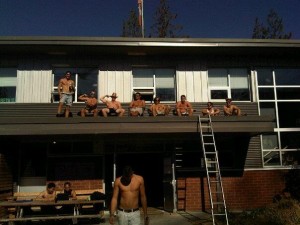Life of a university student, more specifically a UBC student, surely comes with a number of difficulties that would get us thinking: What did we do to end up here? As students, we get so caught up by our own troubles, that we don’t consider their historical and biographical context. In other words, we don’t really understand how our problems can have an effect on the society that surrounds us. We usually think that our personal problems only affect us individually, yet there is actually a connection between our issues and the framework of society.
In his article “The Promise of Sociology”, C. Wright Mills introduces the concept know as the Sociological Imagination, a non-individualistic way to look at our personal problems in a much larger scale. Sociological Imagination shows us the distinction between a “personal trouble” and a “public issue” and helps us identify the relationship between our own individual troubles and problems that are on a larger scale.
Imagine a UBC student who is under a financial struggle to pay for his education. Let’s call him Bart. Bart is pursuing his university education in UBC as a business student in Sauder and, due to not being financially able to afford schooling himself, is being funded with student loans. He then eventually faces student debt after completing his degree, and is stressed with having to earn the money he needs to repay his student loans. This would be known as a personal trouble, because the issue he is facing exists within himself.
Now, how can we view Bart’s problem on a larger scale? He surely wouldn’t be the only person facing financial troubles in university, let alone facing student debt. As a public social issue, having a large amount of students facing debt would affect the student community within the university and could possibly lead to changes in tuition costs or a change in the number of students attending UBC. Student loans and student debt can be seen as public issues because of how they extend beyond an individual’s personal problem, helping us understand the structure of society and how it can be amended.
The recent protest that occurred outside the Koerner library regarding fairness in tuition and housing process is an example of how public issues can change the structure of society. Because of proposed increases in tuition costs and residence contracts, students demanded lower costs in order to make their university experience much more fair and affordable for them. By protesting and expressing their outrage for the increase in housing and tuition costs, students are using their voices to promote change in the current social order. It is also worth thinking about how each student has their own personal troubles that are financial, which contributes to the amount of students financially struggling because of the high tuition and housing costs. Each student would have their own personal reasons to be involved in the protest, and with the amount of students who appeared outside the library to oppose the status quo, it is clear that the increase in tuition and housing costs is a public social issue that calls for change within the university system at UBC.
The use of Sociological Imagination is a helpful tool that we can use to analyze aspects of our lives and of those around us. In addition, it can help us understand why events such as the protest against increased costs take place and the issues that are to be addressed. By thinking about the relationship between personal troubles and public issues, we will be able to realize how the things that happen to us can affect the structure of the society we live in.
References:
Mills, C. W. (1959). The Sociological Imagination. New York: Oxford University Press, 1959.
